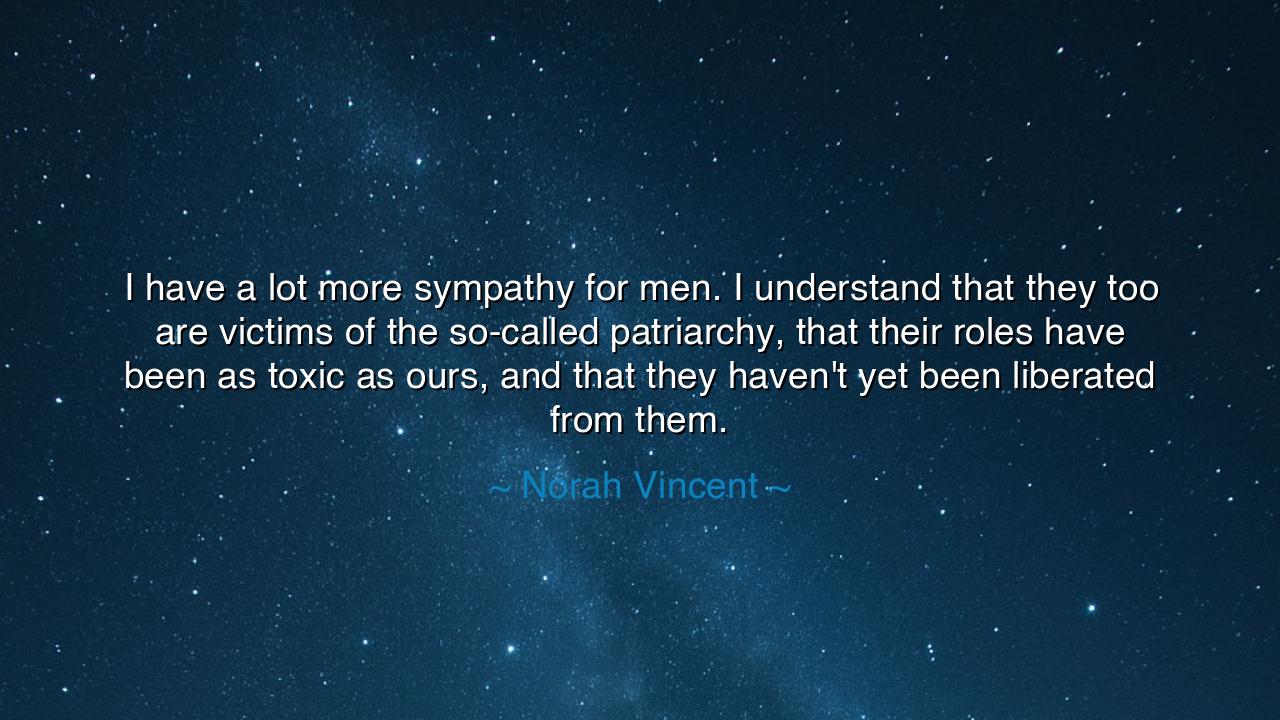
I have a lot more sympathy for men. I understand that they too
I have a lot more sympathy for men. I understand that they too are victims of the so-called patriarchy, that their roles have been as toxic as ours, and that they haven't yet been liberated from them.






When Norah Vincent declared, “I have a lot more sympathy for men. I understand that they too are victims of the so-called patriarchy, that their roles have been as toxic as ours, and that they haven't yet been liberated from them,” she spoke words as piercing as a prophet’s lament. For in an age where blame is cast like stones, she turned her gaze not only upon the chains of women but also upon the burdens of men. In this recognition lies a deeper truth: oppression is not the wound of one alone, but the shackle that binds all who live under its system.
The origin of her insight came not from abstract philosophy, but from lived experience. Vincent, through her bold experiment of living disguised as a man for her book Self-Made Man, walked for a season in the shoes of the other. She saw firsthand the weight of expectation, the demand for hardness, the suppression of vulnerability. And in those hidden corners of men’s lives, she discovered not privilege alone, but suffering—a suffering seldom spoken, seldom wept for. Thus her sympathy grew, and her words became testimony that patriarchy enslaves not only women but men as well, each in their own tragic way.
History too offers examples of this dual bondage. Consider the warriors of Sparta, exalted as the fiercest of men. They were lauded as ideals of masculine strength, yet from birth they were stripped of tenderness, of choice, of freedom. They lived and died as instruments of war, unable to be fathers in the fullest sense, unable to be vulnerable, unable to love without shame. Was this not also a prison, gilded though it was in honor? So too have countless men, across ages and cultures, been forced to bear stoicism, aggression, and dominance as masks, even when their hearts longed for gentleness.
The meaning of Vincent’s words is therefore revolutionary: true liberation cannot belong to one sex alone. If women are to be free from the burdens of submission, men must also be freed from the burdens of domination. The role of the master can be as poisonous as the role of the servant, for both are distortions of humanity. To heal one without the other is to leave the wound festering. In this, Vincent teaches us that sympathy must be wide, that compassion must embrace both halves of the human whole.
And the lesson for us is not one of pity alone, but of responsibility. We must learn to see the invisible pain in those whom society calls privileged. We must listen to the silences of men who have been told they may not weep, who have been taught that their worth lies only in conquest, provision, or power. To dismiss their suffering is to perpetuate the very system we seek to dismantle. Liberation demands not rivalry, but mutual recognition, where man and woman alike acknowledge the chains that bind them and labor together to break them.
What, then, should you do? First, practice empathy beyond the boundaries of your own struggle. Listen to the pains of others, even when they seem to stand in places of strength. Second, resist the temptation to see liberation as a contest of sexes; instead, see it as a shared journey. Third, teach both boys and girls that humanity is broader than the roles imposed upon them, that tenderness is not weakness, that strength is not cruelty, that freedom is the right of all.
Thus, let Vincent’s words echo as a teaching for generations: the true enemy is not man against woman, nor woman against man, but the toxic roles that have caged them both. To free one is not enough; both must be released, for only then shall humanity walk upright in dignity. And the wisdom we must carry forward is this: sympathy is not weakness but vision—the vision to see that the liberation of one is bound forever to the liberation of all.






AAdministratorAdministrator
Welcome, honored guests. Please leave a comment, we will respond soon